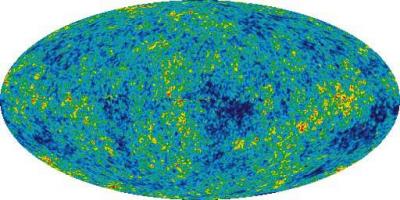I’m loath to interject politics or religion here – I already have venues for both elsewhere – but I can’t help my reaction to this:
Is that the face of God? in one sense, yes. That’s the 5-year data from the Wilkinson Microwave Anisotropy Probe (WMAP) and it shows the residual photos from the Big Bang, now cooled down to 2.725 +/- 0.0002 degrees Kelvin. Yeah, the color variations on that scale are only 2/10 thousandths of a degree. But what’s more striking about this is the implication of how much we don’t see:
The energy budget of the Universe is the total amount of energy and matter in the whole cosmos added up. Together with some other observations, WMAP has been able to determine just how much of that budget is occupied by dark energy, dark matter, and normal matter. What they got was: the Universe is 72.1% dark energy, 23.3% dark matter, and 4.62% normal matter. You read that right: everything you can see, taste, hear, touch, just sense in any way… is less than 5% of the whole Universe.
The WMAP data also conclusively demonstrates that the Universe is flat, which has further implications about the inevitable and fundamental limitations of our observational capabilities:
Our successors, whoever and wherever they are, may have no way of finding out about the Big Bang and the expanding universe, according to one of the more depressing scientific papers I have ever read.
If things keep going the way they are, Lawrence Krauss of Case Western Reserve University and Robert J. Scherrer of Vanderbilt University calculate, in 100 billion years the only galaxies left visible in the sky will be the half-dozen or so bound together gravitationally into what is known as the Local Group, which is not expanding and in fact will probably merge into one starry ball.
Unable to see any galaxies flying away, those astronomers will not know the universe is expanding and will think instead that they are back in the static island universe of Einstein. As the authors, who are physicists, write in a paper to be published in The Journal of Relativity and Gravitation, “observers in our ‘island universe’ will be fundamentally incapable of determining the true nature of the universe.â€
Krauss has a piece in Scientific American where he expands on this:
We are led inexorably to a very strange conclusion. The window during which intelligent observers can deduce the true nature of our expanding universe might be very short indeed. Some civilizations might hold on to deep historical archives, and this very article might appear in one—if it can survive billions of years of wars, supernovae, black holes and countless other perils. Whether they will believe it is another question. Civilizations that lack such archives might be doomed to remain forever ignorant of the big bang.
Why is the present universe so special? Many researchers have tried to argue that the existence of life provides a selection effect that might explain the coincidences associated with the present time [see “The Anthropic Principle,†by George Gale; Scientific American, December 1981]. We take different lessons from our work.
First, this would quite likely not be the first time that information about the universe would be lost because of an accelerating expansion. If a period of inflation occurred in the very early universe, then the rapid expansion during this era drove away almost all details of the preexisting matter and energy out of what is now our observable universe. Indeed, one of the original motivations for inflationary models was to rid the universe of pesky cosmological objects such as magnetic monopoles that may once have existed in profusion.
More important, although we are certainly fortunate to live at a time when the observational pillars of the big bang are all detectable, we can easily envisage that other fundamental aspects of the universe are unobservable today. What have we already lost? Rather than being self-satisfied, we should feel humble. Perhaps someday we will find that our current careful and apparently complete understanding of the universe is seriously wanting.
So, that WMAP data above? An ephemeral wisp of data that will fade away. We are fortunate in that sense to be able to see the face of God, because it’s not going to be there forever.
Sometimes I wonder if we really aren’t living in Douglas Adams’ universe after all. Where else, in a Universe where the Ultimate Answer is 42, and the Last Message to Creation is “we apologize for the inconvenience”, would it be true that someday, the Big Bang is destined to someday be a mythological event whose existence will be unprovable by the best available evidence? Will the WMAP data become the icon for Unintelligent Design?

2 responses to “reality is filtered”
I find this unaccountably saddening. Not in a bad way, more like a tragic one.
Well, back to work.
hey Thomas your monster is cool! vaguely lionesque.
It is kind of hard for me to wrap my brain around it, to be honest – we are talking about timescales so large that the question of whether humanity itself exists will be an open one. Will there be anyone left to wonder? Or will we be so advanced so as not to care, or to be bound by mere observation of the skies as we are now? Impossible to know.